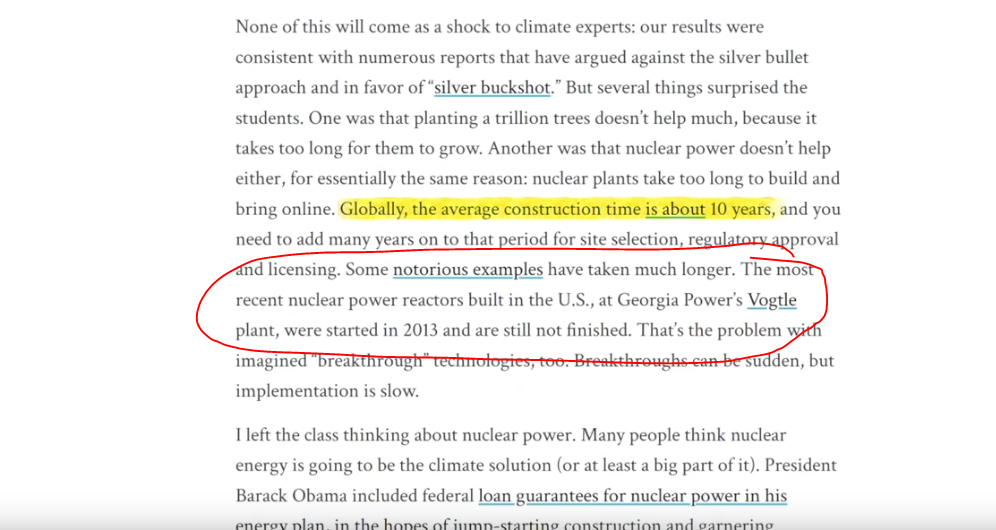Sabine Hossenfelder summed it up pretty well. Your brain is electrical with maybe some quantum effects. So its function is either deterministic when it’s acting classically, or totally random when acting quantum mechanically. Where is there room for free will?
I really enjoyed watching Sabine Hossenfelder videos until she covered a topic (nuclear power) that I had even some passing knowledge on. She omitted current data from the past few years and instead used 20 year old data that supported her argument. She presented technologies which are mostly lab experiments as commonplace in commercial use today.
Its made me skepitcal about anything she reports on.
I’ve watched some of the nuclear videos. Can you be more specific in your criticism for my personal benefit?
This is from memory, but here’s two things:
-
She chose to use nuclear plant construction costs from the early 1980s instead of the much more recent and accurate and much more expensive Vogtle nuclear power plant that came online last year. Using real world Vogtle costs completely obliterate the narrative that nuclear power is cost effective which was one of her prime arguments.
-
She said [paraphrased] “Nuclear reactors can be built safe, like Thorium reactors that can’t melt down because there’s a plug that reacts to high heat and will drain the reactor before damage can occur”. To the best of my knowledge there have been only a couple Thorium research reactors ever built and both of those were small experimental size back in the 1970s or 1980s. Certainly no utility grade commercial Thorium reactors are in operation today, and presenting the safety features from what is essentially a theoretical science experiment as the industry available commercial technology is extremely misleading.
She gets a lot of criticism for talking about things that arent strictly physics. Sometimes deservedly.
However, I didn’t come away from her videos with the belief that nuclear plants are particularly cost effective or that Thorium is some sort of magical tech, but more that if we want to get away from fossil fuels yesterday, then we need to be ramping up all forms of alternative energies in parallel with each other, and that we should have been building new nuclear plants 10 years ago, but the second best time is today.
As flawed as maybe those two points you brought up are, she had many more, and I agree with the gist of the video that we as a planet should be investing in nuclear, or at least not dismissing it outright like some countries are. It needs better research than she can do, and if it’s truly favorable, it needs people to stop fighting it because the alternative is so much worse.
I like that she’s not afraid to be controversial, even if that means being wrong sometimes. I really liked her video on the prevalence of autism, broken down to statistics and sociology. She had a very matter of fact delivery. I don’t think she has an agenda other than the usual YouTuber one of getting clicks,and I don’t think she deliberately uses false arguments.
I’m going to have to rewatch her nuclear power videos now—with what you said in mind—and maybe look for other perspectives. Thanks!
However, I didn’t come away from her videos with the belief that nuclear plants are particularly cost effective or that Thorium is some sort of magical tech, but more that if we want to get away from fossil fuels yesterday, then we need to be ramping up all forms of alternative energies in parallel with each other, and that we should have been building new nuclear plants 10 years ago, but the second best time is today.
The name of her actual video is “Is nuclear power really that slow and expensive as they say?”
She say “does it actually take a long time to build?”, then cites the article here where she highlights the yellow average:

…but then she COMPLETELY IGNORES what I circled in red thats on the exact same page about Vogtle power plant which is the most recent plant built in the USA which suggests its data is most accurate. Instead she looks at a difference source cited in the article which goes back in time to 1976 to early 2000s for data instead of 2023 data of Vogtle:

Its one thing to not have the data, but to intentionally ignore data citing in the article your criticizing and cherry picking old data in my mind is intellectually dishonest.
And again she does this:

Why are you skipping the 2023 data Sabine?
Here she’s mixing lots of old and new data to arrive at the “median time for nuclear power plant construction in the USA”. I’m not sure how thats a useful metric when you’re incorporating 50 year old data.

This is especially true because we don’t have to model the data, we have a real life recent example with Vogtle:
“Two additional units utilizing Westinghouse AP1000 reactors began preliminary construction in 2009, with Unit 3 being completed in July 2023.” source
So no, Sabine, we shouldn’t think it takes 91 months but instead what it actually took which was 168 months.
She says “in the 1950s they built them much faster in 21 months”. Great! So now we’re using 75 year old data instead of 1 year old data to make our point?
Then she gets to costs and says “it takes $5 to $10b to build a nuclear power plant in the USA”

Okay so Vogtle (again the most recent data) was in this neighborhood for cost? Nope not even CLOSE:
“In 2023 costs had increased to $34 billion, with work still to be completed on Vogtle 4” source
It just gets worse the longer the video goes on.
I don’t have time to read all that just now, but I feel like focusing on the singular most recent reactor’s build time is cherry picking. What’s wrong with looking at decades of data of build time and costs? Costs can be normalized for inflation and markets, and average build times are much more important than a single reactors’s build time even if it is the most recent one. I don’t get why you’d focus on that single reactor. How are you so sure it represents some new average?
I don’t have time to read all that just now, but I feel like focusing on the singular most recent reactor’s build time is cherry picking. What’s wrong with looking at decades of data of build time and costs?
Because the next most recent reactors are many decades older. The next most recent project would likely be Watts Bar plant which started in 1973 and finished one of two reactors online in 1996 (23 year construction project!!!) or its second reactor which also started in 1973 and came online in 2016 an astounding 43 years from construction to being online.
To remove THAT “outlier” you have to go back 1989 a full 35 years ago. If you’re going back that far, doesn’t that raise the question “how many more recent modern nuclear plant projects in the USA do you have to ignore before you get favorable numbers?”. If the more recent project keep taking way more time and costing way more money, why would we expect a project starting today to match what occurred in the 1970s instead of what happened in the 21 century?
Costs can be normalized for inflation
True
and markets,
Which markets? Electricity prices?
and average build times are much more important than a single reactors’s build time even if it is the most recent one.
That assumes that we could still build them like we did many decades ago. The knowledgeable people that ran those projects retired and weren’t replaced. Additionally, regulatory rules and safety rigor are much higher than they were back then negating that build time/cost from back then.
I don’t get why you’d focus on that single reactor. How are you so sure it represents some new average?
I don’t understand why drawing data from 35+ years ago is considered more accurate than data obtained in the last 20.
-
Same with her report on autism. I wish she would just stick to physics.
Dualists believe that the mind somehow exists independent of the physical structures of the body, but I’ve never found that convincing. Sounds like magic.
No one has defined free will to me yet. So i guess if i have it depends on what it is.
Free will is a nonsense concept - either our actions are pre-determined by existing conditions (memory, DNA, magnetic waves, weather, nutrition, ads, etc) or our actions are determined by existing conditions plus some amount of chance.
If it’s the first one, then theoretically our actions can be predicted, but because all the conditions can’t be known and accounted for then a completely accurate prediction is impossible.
If it’s the second one, then a completely accurate prediction is also impossible.
For theology, it only matters because God torturing people for eternity based on things he set in motion is evil.
For real life it matters less. We still “want” to do the things we do. If anything it means if we want to improve the world we should take a closer look at conditions which create a situation, instead of just expecting people to make a better choice.
But what if I DECIDE to poop my pants?
It would be either because of the chaos of the universe or God’s plan
For real life it matters less. We still “want” to do the things we do. If anything it means if we want to improve the world we should take a closer look at conditions which create a situation, instead of just expecting people to make a better choice.
If we know conditions that affect our own decisions, then wouldn’t that allow each of us to create better conditions for decision making, or at least avoid decision making when we know for a fact conditions present at that moment produce poor decisions?
Yes! Awareness of the conditions that lead to a decision is also a condition that leads to a decision. It’s just there are many factors at play, so it’s not the only one.
Also I was more talking about societal/systemic change. If we want to see changes in people’s actions as a trend, we should consider more than telling people “you need to do better.”
I chose free will and did not watch the stupid video claiming I have no free will 😎
What if you were programmed to “choose free will” after being presented with these stupid conditions?
I’m going to exercise my lack of free will and call you an idiot. Because that was induced by your stupid comment. I’d say I’m sorry, but I have no say in the way the cookie crumbles.
damn can’t argue with that. bro has no free will
I see what you did there!
deleted by creator
Yeah no. They’re just going to try to use this to charge people with crimes before they commit them. I should not have to explain why this is bad and how it can be abused. We all have to shut this kind of talk down to nip it in the bud and it starts in internet comment sections. Do not let this gain momentum. Do not be an authoritarianism shill.
This is bullshit.
tl;dr generated by AI:
The video features Stanford professor Robert Sapolsky discussing the concept of free will and how our biology, environment, and various other factors beyond our control significantly influence our behavior and the choices we make. Sapolsky argues that we are shaped by these factors from the moment we are conceived, leaving little room for the traditional understanding of free will. He uses examples like Phineas Gage’s brain injury and judges’ parole decisions influenced by their physiological needs to illustrate the impact of distributed causality on human actions. The conversation also explores the evolution of the human frontal cortex, the profound impact of cultural backgrounds on our mindsets and behaviors, and the relationship between artificial intelligence and free will. Sapolsky encourages individuals to focus on understanding and empathy rather than blame or punishment when it comes to human behavior.



